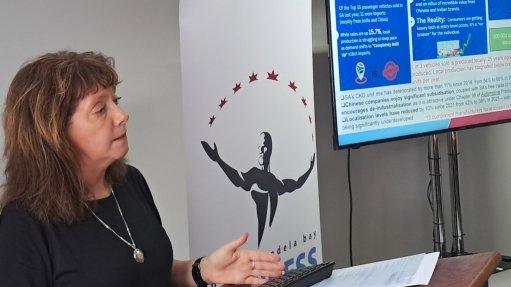Opinion: Presidential Climate Commission’s electricity recommendations – a reflection from labour
In this article, Congress of South African Trade Unions (Cosatu) head of policy Lebogang Mulaisi writes that the Presidential Climate Commission's (PCC's) electricity recommendation signals a potential structural shift in electricity planning for South Africa and what this could mean for labour.
According to the Global Change Institute, based at the University of the Witwatersrand, one of the top five risks of climate change is “a badly-handled transition to low-carbon energy.” An unjust transition represents a lost opportunity to democratise ownership within the energy sector.
The PCC electricity recommendation signals a potential structural shift in electricity planning for South Africa. The recommendations include no new coal and a managed closure of coal-fired power stations at the end of their life cycle. The PCC also calls for an energy system dominated by renewable energy as evidence shows them to be secure, reliable, and least cost.
The PCC expects a policy-adjusted Integrated Resource Plan (IRP) to promote about 50 GW to 60 GW of variable renewable energy by 2030, supported by co-located storage and between 3 GW and 5 GW of gas (running at low utilisation to support balancing and peaking). Additionally, the PCC recommends pricing reform throughout the electricity value chain for Eskom to recover its full costs to boost sustainability and energy availability factors.
What do these recommendations mean for labour in South Africa, particularly the workforce that is directly involved in the coal value chain?
To put matters into context, the coal value chain employs over 120 000 workers and has indirectly supported many communities, particularly in Mpumalanga, where mining and power generation have been concentrated. The transition to a low-carbon energy system holds significant risks for workers, economies and regions that are dependent on coal if it is not undertaken in a just manner. Key risks for workers include retrenchments due to businesses closing down and the decommissioning of power stations in haste, without the necessary labour protections. Unionised workers face the risk of losing their jobs, and unions losing their members (weakening their collective bargaining power).
However, there are different categories of workers that will be affected differently. Contract workers, in particular, are at risk as employers do not take responsibility for their ongoing support or upskilling. The small businesses in these communities will also lose their source of income and livelihoods if this transition is not managed and does not include their perspectives and account for their needs. Support industries such as logistics, railways, port, and shipping companies and their workers are also at risk. Job losses in the mining and energy sectors would also potentially mean that the traditionally strong labour movement in South Africa could lose strength in numbers.
This could significantly change the political balance in the country. Hence, we need to embed a just transition across all critical policies and our electricity planning.
A SOLUTION-MINDED APPROACH
Abundant and affordable electricity will enable economic diversification and competitiveness. To create additional jobs, government should incentivise green industrial development, economic diversification, and the localisation of key transition value chains, particularly in at-risk regions. The PCC and others are already working on this.
Investing in human resources and skills development is an immediate priority. Integrated government planning needs to support those most impacted by loadshedding, particularly SMMEs and indigent households, by providing and enhancing social protection measures, particularly for those workers and communities impacted by the transition.
Although concerns have primarily been articulated around the energy transition, it similarly applies to other sectors. For example, an unmanaged shift to electric vehicles (EVs) in the automotive industry could result in extensive job losses. Most estimates suggest that EVs require fewer jobs to produce and less maintenance and service, and impacts worsen if all parts of assembled vehicles are imported. This could impact many parts of the Eastern Cape, where automotive manufacturing is a key employer. A risk exists if the automotive sector can no longer export petrol/diesel cars because of reduced demand, also leading to job losses.
Energy planning in the context of the four crises that plague South Africa: poverty, unemployment, inequality, and now energy insecurity, remains a serious threat to shared prosperity. The ‘just transition’ is not just an appealing catch-phrase in documents, but rather a key lever to unlock the full potential and ambition for the transition to a low-carbon economy.
Article Enquiry
Email Article
Save Article
Feedback
To advertise email advertising@creamermedia.co.za or click here
Press Office
Announcements
What's On
Subscribe to improve your user experience...
Option 1 (equivalent of R125 a month):
Receive a weekly copy of Creamer Media's Engineering News & Mining Weekly magazine
(print copy for those in South Africa and e-magazine for those outside of South Africa)
Receive daily email newsletters
Access to full search results
Access archive of magazine back copies
Access to Projects in Progress
Access to ONE Research Report of your choice in PDF format
Option 2 (equivalent of R375 a month):
All benefits from Option 1
PLUS
Access to Creamer Media's Research Channel Africa for ALL Research Reports, in PDF format, on various industrial and mining sectors
including Electricity; Water; Energy Transition; Hydrogen; Roads, Rail and Ports; Coal; Gold; Platinum; Battery Metals; etc.
Already a subscriber?
Forgotten your password?
Receive weekly copy of Creamer Media's Engineering News & Mining Weekly magazine (print copy for those in South Africa and e-magazine for those outside of South Africa)
➕
Recieve daily email newsletters
➕
Access to full search results
➕
Access archive of magazine back copies
➕
Access to Projects in Progress
➕
Access to ONE Research Report of your choice in PDF format
RESEARCH CHANNEL AFRICA
R4500 (equivalent of R375 a month)
SUBSCRIBEAll benefits from Option 1
➕
Access to Creamer Media's Research Channel Africa for ALL Research Reports on various industrial and mining sectors, in PDF format, including on:
Electricity
➕
Water
➕
Energy Transition
➕
Hydrogen
➕
Roads, Rail and Ports
➕
Coal
➕
Gold
➕
Platinum
➕
Battery Metals
➕
etc.
Receive all benefits from Option 1 or Option 2 delivered to numerous people at your company
➕
Multiple User names and Passwords for simultaneous log-ins
➕
Intranet integration access to all in your organisation





















